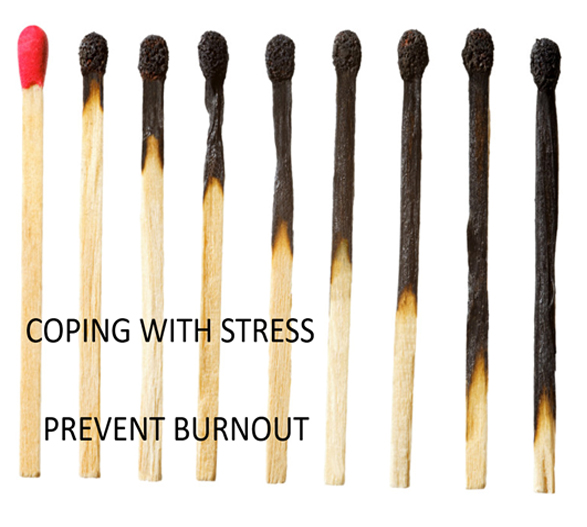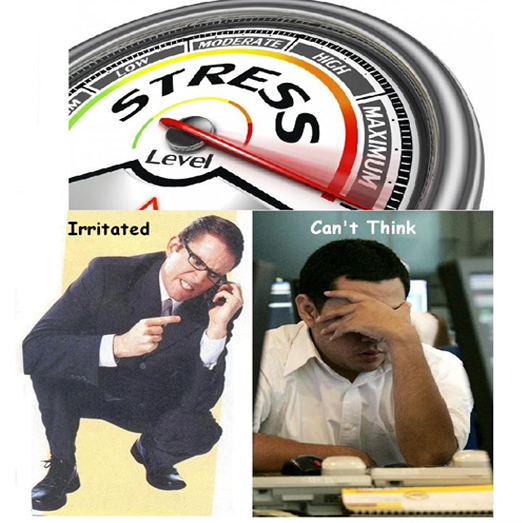What Is Stress?
Stress is a physiological condition that results from a perception of demands being greater than available resources. The perception triggers a surge of hormones from the brain that cascades down to the adrenal glands secreting anxiety mediating cortisol.


Stress Prevention
Sensitivity and awareness about emotional chemistry can help individuals and organizations to prevent stress at points of generation, rather than to allow stress to build up and then organize stress relief camps. The usual suspects that notoriously cause stress are unregulated emotion and reaction patterns, ego issues and the inability to digest and deal with criticism. Resultant relationship problems multiply and complicate issues spiraling stress into a consuming vortex.
Ego problems generate in the subconscious and often individuals are clueless about why they react in certain ways. The physiology of social pain (such as rejection) and physical pain have been studied and it has been found that social discomfort activates the same parts of the brain as evolutionarily created for sensing physical pain. Activation in those regions will naturally cause a fight or flight reaction: avoidance, aggression, vindictiveness and wanting to hurt back, while the body reacts with increased blood pressure, higher heart rate, increased blood sugar and tensing of muscles.
Emotional Intelligence training helps people to identify toxic patterns and break them. With practice we can learn to identify the triggers and choose not to jump on the rails of repetitive and ingrained reaction and benefit by not having to control the resultant damage to relationships that invariably follows.
Relationships are based upon empathy and the unit of empathy and social intelligence is the mirror neuron. Their discovery in the late eighties and subsequent research has demystified empathy, trust, intention and thought. There is now scientific evidence that fulfilling long-term relationships have psychological, hormonal and immunological benefits. Quality relationships protect biological systems from succumbing to the toxic effects of stress.
Health And Happiness
Mitigation of stress prevents a host of diseases and contributes to good health. Apart from ego hassles, misdirected anger and learning to deal with criticism which is also connected with ego balance, sadness is known to generate and exacerbate disease.
When people function at levels lower than capability they experience deep sadness, perhaps even if they are unaware about their real potential. Inability to get along with others, to strike up and maintain long-term relationships erodes a person’s image and proves detrimental to career growth. Low EQ persons will find fewer opportunities coming their way in comparison to popular colleagues. Poor interpersonal relation with superiors and team causes people to withhold talents and not give their best, resulting in mediocre performance in spite of high potential.
Emotional Intelligence helps individuals to actualize their potential. Mentors and team leaders who are aware about emotional blocks to talent expression benefit from leveraging the best from team members and create organizational environments conducive to unleash creativity.
Working at top form and being in flow are situations that release endorphins in the body. Being creative is also an endorphin releasing activity, as is laughing whole-heartedly, helping people and contributing to a cause. Physiologically the benefits from these activities are the same as reaped from aerobic exercise and meditation. Endorphins are the hormone of happiness. They are indigenous pain-killers. Endorphins improve intelligent brain function, relax the heart and normalize blood pressure, boost the ability to fight infection and to repair worn out tissues. Happiness engineers positive health.
Organizations that pay hefty health bills or finance health insurance for employees find it prudent to focus on occupational health hazards and institute preventive health measures. Raising awareness about Emotional Intelligence helps by helping people to actualize potential and raise satisfaction / happiness levels and through minimizing stress and protecting people from the toxic action of chronic exposure to hormones of negative emotions. Prolonged action of cortisone, adrenaline and noradrenaline (hormones of stress, fear and anger respectively) causes damage to brain tissue and immune cells apart from the more well-known effects of damage to heart, kidneys, blood vessels and blood sugar metabolism.
Burnout
Qualified and eminently ‘employable’ individuals when placed in demanding and stressful positions deliver at high productivity for a while but run the risk of ‘Burnout’. This phenomenon may manifest as physical illness, disillusionment, lack of respect for others, cynicism, toxic behavior, callousness and hankering for change. People who cannot strike up supportive relationships at work, those working in dangerous environments and professionals expected to deliver high levels of care and concern for long hours (e.g. nurses) are especially prone to burnout. Organizations and employers who are aware about the causes of burnout will be able to design systems of support to prevent it and retain some valuable workers.
Warning Signs Of Burnout / Impending Burnout
- Making careless mistakes
- Not taking enough care of myself.
- Don’t seem to have any new ideas
- Feeling like you’re always failing. Can’t do anything right!
- Always catching up.
- Taking everything personally, sensitive to every comment even if it was not about me.
- Exhaustion despite regular sleep
- Renewing an old bad habit
- Unexplained pain
- Inability to concentrate
- Being constantly bored
- Losing imaginativeness
- Frequent head colds (and worse)
- Dizziness and headaches
- Being hurtful to others
- Unable to enjoy celebrations
Internal Causes Of Stress
- Inability to Regulate Surging Emotions like Anger, Anxiety, Depression
- Inability to find the right Balance between Extreme Self Love and Dissatisfaction with Self
- Inability to Deal with Criticism and Competition
- Lack of Impulse Control leading to Mistakes and adverse outcomes
- Lack of Resilience
- Relationship Problems
External Causes Of Stress
- Serious financial trouble
- Job crisis
- Lawsuit / divorce
- Isolation / love-lessness
- Illness of self or family members
- War / political instability
- Disasters / Pandemic
Toxic Emotional States
- Chronic anxiety / fearfulness
- Long periods of sadness
- Pessimism
- Unremitting tension
- Incessant hostility
- Cynicism
- Suspiciousness
- Low self esteem
Common Stress Linked Ailments
- Asthma
- Arthritis
- Headache
- Peptic ulcers
- Heart disease, High Blood Pressure
- Increased susceptibility to infections and cancers due to suppression of the immune system
- Early onset of diabetes
- Increased requirement of insulin
- Skin Problems
